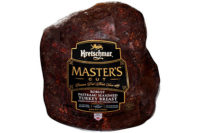The Meat Science and Muscle Biology program at the University of Wisconsin – Madison has a long and rich history in conducting important basic and applied research, providing training for meat scientists at the undergraduate, post-baccalaureate and post-graduate levels, and disseminating information to various audiences including Wisconsin stakeholders.
As part of that unique past, UW-Madison served as the first meeting place for the newly formed American Meat Science Association in 1964. UW-Madison was the professional home to Dr. Robert W. Bray, professor of Meat Science and Muscle Biology, who served as the first elected president of AMSA, and whose academic “offspring” have gone on to become leaders and mentors in meat science throughout the U.S. and the world.
On June 14-18, 2014, AMSA members will return to Madison for the 67th annual Reciprocal Meats Conference, co-hosted by the University of Wisconsin and Kraft Foods/Oscar Mayer, where organizers expect to see more than 700 academic, industry and government meat scientists, and students converge for this 50-year reunion.
The UW-Madison Meat Science and Muscle Biology Laboratory has research laboratories, instructional classrooms and a state-inspected meat processing facility with capabilities of animal slaughter and carcass evaluation, meat processing and muscle biology research, and is home to Bucky’s Butchery, a retail store for fresh and processed meat products with a large, loyal customer base. Bucky’s Butchery employs over a dozen part-time undergraduates who gain extensive experience in many facets of the meat industry. The Meat Science and Muscle Biology Laboratory houses 4 full-time faculty, 4 emeriti and adjunct faculty members, 4 full-time staff members, and 10 graduate students and post-docs. Through a number of courses, students gain valuable hands-on experience in live animal evaluation, muscle biology, fresh meats, and meat processing taught by a variety of faculty, staff and industry professionals.
Researchers have expertise in areas such as fresh meat color, poultry, lipid oxidation, muscle biology, processed meats, and food safety. Meat scientists work collaboratively with several departments on campus such as Microbial Sciences, Food Science, Medical Microbiology, and Biochemistry, to name a few.
Wisconsin is home to hundreds of meat processing plants ranging from small, family owned establishments to large operations. To support the industry, UW-Madison Meat Science provides many extension programs. Perhaps the most notable of these is the Master Meat Crafter Training Program, a result of collaborative efforts between UW Meat Science and the Wisconsin Department of Agriculture, Trade, and Consumer Protection, launched in 2010. Over the course of the two-year program to become accredited as Master Meat Crafters, participants attend short courses on meat processing topics, complete several homework exercises, and develop and complete in-plant mentorship and research projects. Other extension activities include processed meat product judging at the state and national levels, hosting state 4-H and FFA meat judging contests, and more.
University of Wisconsin-Madison is a member of the American Meat Science Association. For more information about the University of Wisconsin-Madison and its faculty, please visit the AMSA website at http://www.meatscience.org/page.aspx?id=64.







Report Abusive Comment